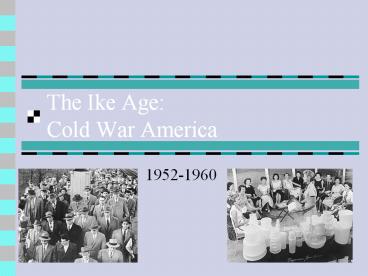The Ike Age: Cold War America - PowerPoint PPT Presentation
Title:
The Ike Age: Cold War America
Description:
The Ike Age: Cold War America. 1952-1960 'I Like Ike': Eisenhower and America ... Eisenhower and the Cold War. Containment vs. 'Liberation' ... – PowerPoint PPT presentation
Number of Views:216
Avg rating:3.0/5.0
Title: The Ike Age: Cold War America
1
The Ike AgeCold War America
- 1952-1960
2
I Like Ike Eisenhower and America
- Dwight David Eisenhower (1890-1969)
- Ike and the Republicans
- Conservative wing
- Midwest West
- Isolationist
- Favored Robert A. Taft
- Moderate/liberal wing
- Eastern
- Internationalist
- Favored Eisenhower
3
Adlai Stevenson
Eisenhower choose Richard Nixon as running-mate,
in part to appease the Republican partys
conservative wing. Republicans also won both
houses of Congress. Eisenhower defeated
Stevenson again in 1956.
4
- Ike and the Historians
- 1960s-1970s
- A failure popular and appealing, but ineffective
and lazy - Evasive in press conferences
- Too much time on the golf links
- Symbol of conformity
- 1980s-
- Hard-working, knowledgeable, engaged
- Legacy
- Peace and prosperity
- Sense of priorities
- Traditional values
- dynamic conservatism
- Sought to steer party away from reaction
- Manage existing government programs better
5
- Balanced Budgets and Highways
- Balanced budgets (5 out of 8 years)
- Sought to return powers to the states
- Federal Highway Act of 1956 Funded construction
of interstate highway system - Largest, most expensive public works program in
U.S. history - Heightened dependence on automobiles
- Accelerated suburban growth
6
- The Civil Rights Movement in the 1950s
- Background
- Jim Crow segregation (Plessy v. Ferguson, 1896)
- NAACP, 1909 legal orientation
- Great Migration to the West North,
1910s-1940s - Trumans Fair Deal proposals desegregation of
the military
7
- Brown v. Board of Education, 1954
- Overturned Plessy v. Ferguson
- Segregated schools a violation of equal
protection clause of 14th Amendment - Desegregation with all deliberate speed (1955)
- White southern reaction
- White Citizens Councils
- Ku Klux Klan
- massive resistance
- Civil rights movement energized
8
- Martin Luther King, Jr.
- Civil disobedience and non-violent resistance
- Montgomery (Ala.) Bus Boycott, 1955-1956
- Arrest of Rosa Parks for refusal to give up bus
seat so white passenger could sit - Year-long boycott of city buses organized by King
other black leaders - U.S. Supreme Court affirmed desegregation of
buses in 1956 - Little Rock (Ark.) school desegregation crisis,
1957 - Eisenhower used federal troops to enforce
desegregation
9
Eisenhower and the Cold War
- Containment vs. Liberation
- Republicans criticized Trumans containment
policies as futile and expensive - John Foster Dulles, Secretary of State
- Suggested U.S. should be willing to liberate
subject peoples from Soviet domination - In reality, Eisenhower would essentially continue
containment
10
- Ikes New Look
- more bang for the buck
- Scale back conventional forces emphasize
strategic (nuclear) air force - Allies supply conventional forces
- Use Central Intelligence Agency to intervene in
trouble spots - Indonesia
- Iran
- Guatemala
11
- massive retaliation
- Nukes are an option
- brinksmanship
- Enemy must believe you will go to the brink of
nuclear war - Credibility equals deterrence
12
- Assessment
- Successes
- End of Korean War
- Armistice signed, June 1953
- China and Taiwan
- Chinese shelling of islands Quemoy and Matsu
- Eisenhower subtly maneuvered out of crises
13
- Suez Crisis, 1956
- Ike refused to back British, French, Israeli
attempts to take Suez Canal from Egypt - Eisenhower Doctrine, 1957
- U.S. would use force to prevent communist
aggression in the Middle East - Consequence of U.S. becoming chief defender of
Western interests in region after Suez Crisis - Rationale for placement of U.S. troops in Lebanon
in 1958 - Geneva Summit, 1955
- Stalin died in 1953
- Moderately successful summit with new Soviet
leader Nikita Khrushchev
14
- Failures
- Hungary, 1956
- Soviets crushed uprising
- Sputnik, 1957
- Seemed to demonstrate U.S. falling behind Soviets
in technology - Lebanon, 1958
- U.S. troops sent in to prop up pro-Western
regime intensified anti-Western sentiment in the
Middle East - U-2 incident, 1960
- Surveillance plane shot down over Soviet Union
pilot captured - Led to cancellation of planned summit with
Khrushchev































